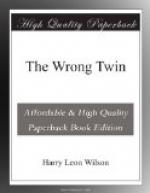“No, sir; I spent it all.”
“Spent all his money!” remarked the dog seller with a kind of pitying contempt, and drew off toward the door. Two more of the courtiers followed as unerringly as if trained in palaces. Solly Gumble bent above the counter.
“Well, now, you young man, you listen to me. You been a right good customer, treating all your little friends so grand, so I tell you straight—you take that fine bird for forty-eight cents. Not to many would I come down, but to you—yes.”
Wilbur Cowan, overcome, mumbled his thanks. He was alone at the counter now, Merle having joined the withdrawn courtiers.
“I’m a fair trader,” said Solly Gumble. “I can take—I give. Here now!” And amazingly he extended to the penniless wreck a large and golden orange, perhaps one of the largest oranges ever grown.
The recipient was again overcome. He blushed as he thanked this open-handed tradesman. Then with his blue jay, his orange, his dog, he turned away. Now he first became aware of the changed attitude of his late dependents. It did not distress him. It seemed wholly natural, this icy withdrawal of their fellowship. Why should they push about him any longer? He was, instead, rather concerned to defend his spendthrift courses.
“Spent all his money!” came a barbed jeer from the Merle twin.
The ruined one stalked by him with dignity, having remembered a fine speech he had once heard his father make.
“Oh, well,” he said, lightly, “easy come, easy go!”
The Merle twin still bore the album and the potent invigorator that was to make a new man of Judge Penniman. His impoverished brother carried the blue jay, looking alert and lifelike in the open, the mammoth orange, gift for Mrs. Penniman—he had nearly forgotten her—and tenderly he led the dog, Frank. Not to have all his money again would he have parted with his treasures and the memory of supreme delights. Not for all his squandered fortune would he have bartered Frank, the dog. Frank capered at his side, ever and again looking up brightly at his new master. Never had so much attention been shown him. Never before had he been confined by a leash, as if he were a desirable dog.
Opposite the Mansion House, Newbern’s chief hotel, Frank gave signal proof of his intelligence. From across River Street he had been espied by Boodles, the Mansion House dog, a creature of dusty, pinkish white, of short neck and wide jaws, of a clouded but still definite bull ancestry. Boodles was a dog about town, wearing many scars of combat, a swashbuckler of a dog, rough-mannered, raffish; if not actually quarrelsome, at least highly sensitive where his honour was concerned. He made it a point to know every dog in town, and as he rose from a sitting posture, where he had been taking the air before his inn, it could be observed that Frank was new to him—certainly new and perhaps objectionable. He stepped lightly halfway across the now empty street and stopped for a further look. He seemed to be saying, “Maybe it ain’t a dog, after all.” But the closer look and a lifted nose wrinkling into the breeze set him right. He left for a still closer look at what was unquestionably a dog.




